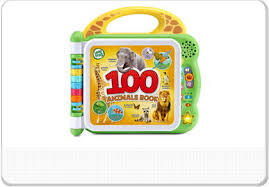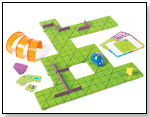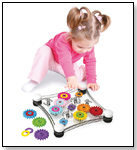|
|
Wonder Forge – a Scrappy Little Upstart is Showing Them How It's Done Early this month, I mentioned that the top five games at ToysRUs included a relative unknown: "At the end of May, ToysRUs reported that its top board game was Lego's Minotauros, #2 was Pictionary by Mattel, #3 Chuggington Matching Game by Wonder Forge, #4 was Angry Birds by Mattel and, finally, #5 was Hasbro's Connect4." I rechecked this morning and found that the Chuggington Matching Game had been totally sold out. As a result, I decided to look a little more closely into this newcomer, Wonder Forge, and interviewed their CEO, Jacobe Chrisman, on 6/29/2012. 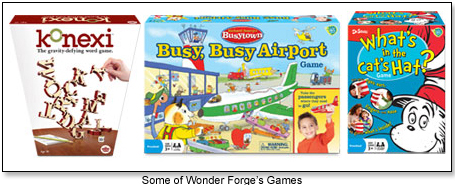 He eventually returned and founded Wonder Forge in 2006 to put his insights into practice. The company is now a still small but rapidly growing player in the board game space with laserlike focus on preschool. Wonder Forge has successfully broken into Wal-Mart, Target, ToysRUs, Amazon and Barnes + Noble; and they expect to expand into Kmart and Kohl's this second half. To differentiate his toys from those of his many competitors, Chrisman went the licensing route, with the result that about 75% of his sales are driven by such licenses as Dr. Seuss, Chuggington, Angelina Ballerina, Richard Scarry and DC Super Friends. This compares with the rest of the boardgame industry which typically only relies on licenses for about 15% of their sales. He very recently also concluded a license agreement with Disney which allows him to bring games under the Princess and Pirates license to market. In fact, he already has commitments for these from Wal-Mart, Target and ToysRUs. Wonder Forge tends to obtain license rights more economically than most, for three reasons. One is that the demand for licenses in their specific age category of games is not as intense as it would be for other types of toys – e.g. action figures or dolls. The second is that they are staying away from movie-driven licenses which typically are more expensive, and which have a much shorter time horizon. The third is that their planning timetable is much longer than what applies to most licenses – Wonder Forge thinks in terms of 10 to 15 years whereas the normal license has a life of about 5 years. They can also be more frugal than most toy companies in terms of media spending – TV and others. The reason for this is that – because they have very strong licenses that are being promoted either by the licensor or by licensees for the same brand but in more advertising-intensive toy categories – they basically piggyback on to these efforts. The short and long of all this is that they have been profitable in every year except one – the first. And they are growing. Not only do they expect to grow this year 86% domestically and 49% internationally, they are already in shipments 23% above the first half of last year and their open order book at the end of June is greater than their entire sales last year. They also estimate that they have already captured something like 20% of the preschool boardgame market in the United States. Hasbro is still the dominant player in this segment and Wonder Forge market share gains will have to come from this competitor. Luckily for Wonder Forge, the more active entrants into the board game space – Mattel, Lego, Spinmaster, Mayfair – tend to concentrate on the 10+ age group and hence are not likely to be an immediate hostile factor for the company. The company is also doing well in terms of consumer interest as measured by the Blog Sphere. The company is in line with Lego, Hasbro and Catan and has stayed pretty steady over the past three months whereas Catan and Hasbro have shown clear declining tendencies. 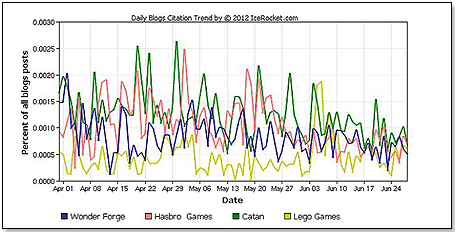 Where the company is doing much less well is in terms of webtraffic. Their website www.wonderforge.com does not provide for consumer purchases nor is it crafted in a way that would encourage visits. In short, they have virtually no callers. Like everybody else, they produce in China through third-party manufacturers. The company tends to go with those factories who already have ties to other major players in the toy space on the premise that these players — Hasbro et al — would only accept good and reliable subcontractors whom they continue to vet thoroughly. Given the very significant slowdown in Chinese toy manufacturing this year, this assumption cannot be taken as gospel any longer. In order to promote their toys, Wonder Forge relies in the United States on in-house sales people, led by the salesman-in-chief named Jacobe Chrisman, who call on the majors. For international — which includes countries such as France, Germany, Scandinavia and very soon South Africa and the U.K. — they rely on distributors which appear to be selected in a manner which is very similar to the method used in identifying subcontractors. Wonder Forge has just succeeded in getting more funding — $1.75 million worth. They intend to use this to finance entries into other product categories. While I do not know this for a fact, I would suspect that this means an extension of their game age profile further up the ladder to the 8 -11 years group and higher. All in all, it is nice to talk to an entrepreneur who is not only in love with his business and his consumer group — the little guys — but is also successful in what he is doing. But then, perhaps, his success is due to the fact that his motivation is not entirely materialistic.  Writer's Bio: Lutz Muller is a Swiss who has lived on five continents. In the United States, he was the CEO for four manufacturing companies, including two in the toy industry. Since 2002, he has provided competitive intelligence on the toy and video game market to manufacturers and financial institutions coast-to-coast. He gets his information from his retailer panel, from big-box buyers and his many friends in the industry. If anything happens, he is usually the first to know. Read more on his website at www.klosterstrading.com. Read more articles by this author Writer's Bio: Lutz Muller is a Swiss who has lived on five continents. In the United States, he was the CEO for four manufacturing companies, including two in the toy industry. Since 2002, he has provided competitive intelligence on the toy and video game market to manufacturers and financial institutions coast-to-coast. He gets his information from his retailer panel, from big-box buyers and his many friends in the industry. If anything happens, he is usually the first to know. Read more on his website at www.klosterstrading.com. Read more articles by this author |
| ||||||||||||||||||||||||||||||||
Disclaimer Privacy Policy Career Opportunities
Use of this site constitutes acceptance of our Terms of Use.
© Copyright 2025 PlayZak®, a division of ToyDirectory.com®, Inc.

